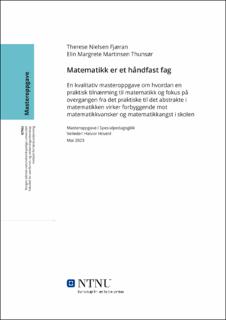| dc.contributor.advisor | Hoveid, Halvor | |
| dc.contributor.author | Martinsen Thunsør, Elin Margrete | |
| dc.contributor.author | | |
| dc.contributor.author | Nielsen Fjæran, Therese | |
| dc.date.accessioned | 2023-07-05T17:25:27Z | |
| dc.date.available | 2023-07-05T17:25:27Z | |
| dc.date.issued | 2023 | |
| dc.identifier | no.ntnu:inspera:147332166:45064552 | |
| dc.identifier.uri | https://hdl.handle.net/11250/3076402 | |
| dc.description.abstract | Formålet med denne studien er å undersøke læreres praktisering av en praktisk tilnærming til undervisning i faget matematikk, og hvordan de arbeider med overgangen fra det praktiske til det abstrakte nivået i matematikken. Vi ønsker også å undersøke om den praktiske tilnærmingen kan virke forebyggende mot matematikkvansker og matematikkangst i skolen. På bakgrunn av dette ble problemstillingen formulert slik: "Hvordan kan en praktisk tilnærming til matematikkfaget og fokus på overganger fra det praktiske til det abstrakte i matematikken virke forebyggende mot matematikkvansker og matematikkangst i skolen?"
Studiens problemstilling har blitt belyst gjennom en kvalitativ metode, hvor vi gjennomførte semistrukturerte intervju. Studiens utvalg består av to lærere som jobber i barneskolen, som har over tjue års erfaring i yrket og som i sin yrkesutøvelse benytter seg av en praktisk tilnærming til matematikkfaget. Analysearbeidet har tatt utgangspunkt i en stegvis-deduktiv-induktiv metode. Gjennom analyseprosessen har vi ivaretatt studiens fenomenologiske perspektiv, ved å søke informantenes erfaringer med fenomenet praktisk tilnærming. Informantenes beskrivelser er videre drøftet i lys av relevant teori og forskningslitteratur knyttet til fenomenet.
Resultater fra studien viser at den praktiske tilnærmingen vil kunne ha fordeler, ikke bare for elevene med matematikkvansker og matematikkangst, men for alle. Ved en praktisk tilnærming vil man ha mulighet til å gi elevene matematiske erfaringer ved å bruke seg selv og fysiske konkreter aktivt i læringsprosessen, hvor undervisningen er nært knyttet opp mot elevenes virkelighet og med stor grad av mestring. En praktisk tilnærming gjør det også mulig for læreren å konkretisere de abstrakte matematiske begrepene og symbolene på en måte som gir elevene erfaringer gjennom sanseopplevelser. Studien avdekker videre at den praktiske tilnærmingen kun gjennom en bevissthet rundt overgangen fra praktisk til abstrakt vil være fordelaktig. Overgangen beskrives som en prosess fra konkret til semikonkret til abstrakt, hvor denne prosessen må ha en fram- og tilbake bevegelse. Datamaterialet belyser også at informantene i tillegg til sin praktiske tilnærming ser på tid og mengde i matematikk som et viktig forebyggende tiltak for matematikkvansker og matematikkangst i faget. Ved å gi elevene tid til å bli trygge på de ulike delene i matematikken gir de elevene forutsetninger for å mestre og få selvtillit i fagets mange deler. | |
| dc.description.abstract | The purpose of this thesis is to investigate teachers' practice of a practical approach to teaching mathematics and how they work with the transition from the practical to the abstract level of mathematics. We also want to investigate whether the practical approach can prevent mathematical difficulties and mathematics anxiety in school. Based on this, the research question was formulated as followed:
"How can a practical approach to mathematics and a focus on transitions from the practical to the abstract in mathematics prevent mathematical difficulties and mathematics anxiety in school?"
The study's research question has been elucidated through a qualitative method, where we conducted semi-structured interviews. The study sample consists of two teachers working in primary schools, who have over twenty years of experience in the profession and who use a practical approach to mathematics in their professional practice. The analysis has been based on a stepwise-deductive-inductive method. Throughout the analysis process, we have maintained the study's phenomenological perspective by seeking the informants' experiences with the phenomenon of practical approach. The informants' descriptions are further discussed in light of relevant theory and research literature related to the phenomenon.
Results from the study show that the practical approach could have benefits not only for students with mathematical difficulties and mathematics anxiety, but for all students. A practical approach allows for mathematical experiences by actively using oneself and physical objects in the learning process, where the teaching is closely connected to the students' reality and with a high degree of mastery. A practical approach also enables the teacher to concretize the abstract mathematical concepts and symbols in a way that provides students with learning through sensory experiences. The study further reveals that only through an awareness of the transition from the practical to the abstract will the practical approach be beneficial. The transition is described as a process from concrete to semi-concrete to abstract, where this process must have a back-and-forth movement. The data material also highlights that the informants, in addition to their practical approach, see time and quantity in mathematics as an important preventive measure for mathematical difficulties and mathematics anxiety in the subject. By giving the pupils time to become confident in the different parts of mathematics, they give the pupils the conditions to master and gain self-confidence in the many parts of the subject. | |
| dc.language | nob | |
| dc.publisher | NTNU | |
| dc.title | Matematikk er et håndfast fag: En kvalitativ masteroppgave om hvordan en praktisk tilnærming til matematikk og fokus på overgangen fra det praktiske til det abstrakte i matematikken virker forbyggende mot matematikkvansker og matematikkangst i skolen | |
| dc.type | Master thesis | |
